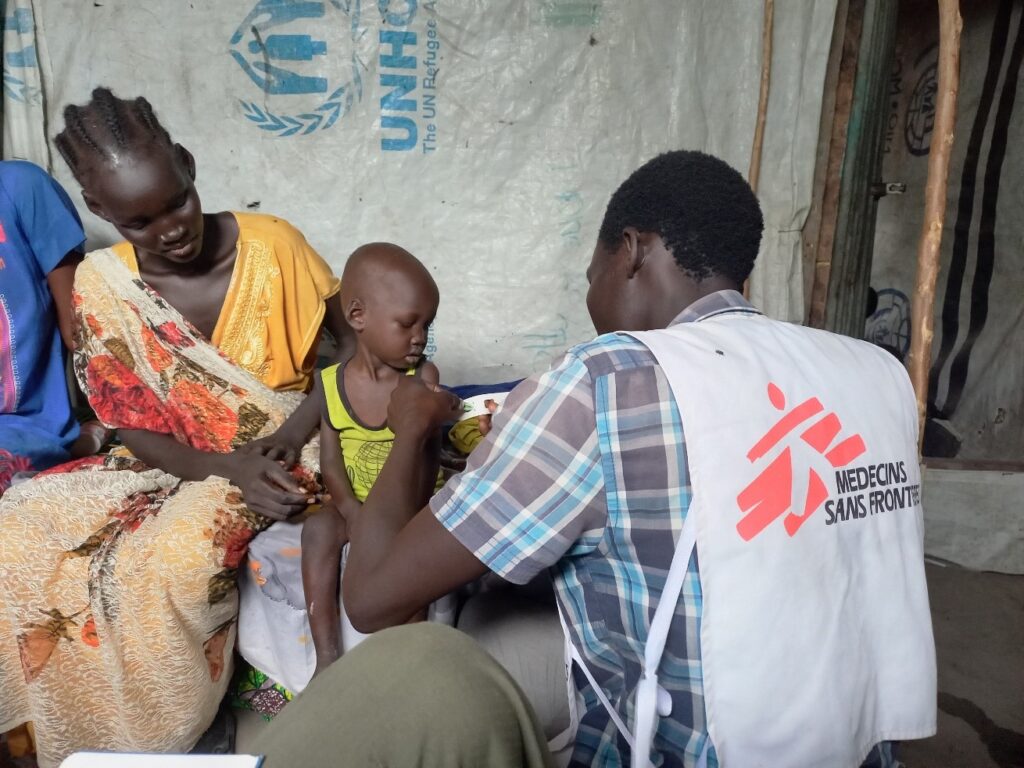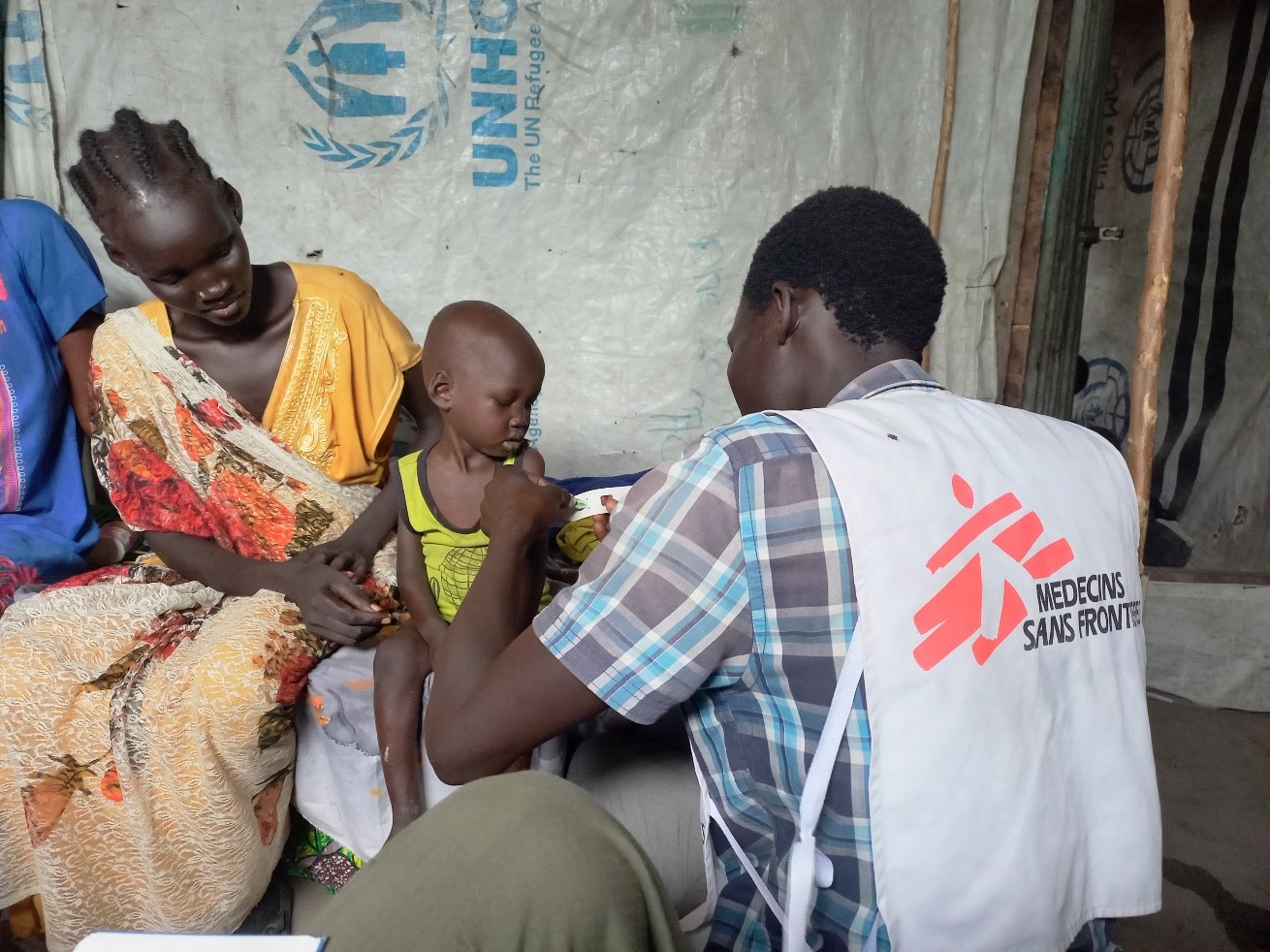South Sudan's English Daily Newspaper
"We Dare where others fear"

By Okech Francis
Tired, weak, stressed and flanked by 8 frail children, Sarah Atem Thon came ashore at Bulukat transit center in Malakal town hugely reassured after months on the road fleeing the conflict in Sudan.
At Bulukat, returnees like Thon are met by a team of health workers deployed by Medecins Sans Frontieres. For the 39 year old, who arrived in the Upper Nile State capital on May 12, after a year in transit, having escaped crisis in neighboring Sudan on April 25, last year, the sight of the MSF health workers helping her and the children was a huge relief.
One of her biggest challenges was ensuring herself and her eight children remained healthy throughout the yearlong transit. “I was aware of MSF medical services in the camp here. I was informed that it is free services provided by MSF. I went to them with my two children and I personally also got treatment there,” Thon told The Dawn from the transit camp for people returning from Sudan.
Medecins Sans Frontieres, the health charity Thon referred to as MSF has pitched up a 24 hour open emergency treatment site to cater for arrivals from Sudan. Bulukat is one of the biggest transit centers and has witnessed the arrival of over 150, 000 returnees since conflict started in Sudan, suddenly increasing the population, and as well hiking health needs.
“The increase in the population was very challenging to the MSF programing. We had to create a completely unique team to be in the Bulukat entry point with a complete mobile clinic, with a complete healthcare team to be able to serve the increasing population of returnees,” Dominic Mwonga, the MSF Emergency Coordinator in Bulukat told The Dawn.
“Also we had to review our budgetary approach including medicine and other materials so that we can be able to serve the increasing population which is of cause in precarious situation, people coming from Sudan without anything, and conditions that need to be quickly taken care of,” Mwonga said.
Malakal town itself was already hosting over 40,000 people at a UN protected camp, escaping from a crisis which began in 2013. That number is likely more than double with the advent of returnees from Sudan joining them. A camp leader put the number of displaced people at the POC at 60,000 before the returnees arrived.
“After the returnees arrived here, the number has grown among the IDPs and the services are also overwhelmed. MSF is working 7 days, IMC is here but they are all overwhelmed by the work and this is because of the returnees coming from Sudan,” Bol Ayom Akaydeng, the Chairman POC Community Coordination Committee said at the camp in Malakal. “This has affected all the services. MSF responds to emergency situations. They are doing their best here in the camp but there are challenges,” Akaydeng said.
The returnees themselves arrive sick, traumatized, hungry and tired, Mwonga acknowledged, also stretching health services at the Protection of Civilian site. He said the strain has been responded to by MSF through scaling up service provision to the people.
“The increase in population has been multiple, both in the town and in the POC, the protection of civilian site,” Mwonga said.
“When we look at the numbers calculated along the humanitarian line, more than 30,000 people (at Renk) chose Malakal as the destination and this has put pressure on our services, both in the children’s hospital in town and also in the adult hospital in the POC, and this means MSF has to adjust its activities including human resource to be able to serve this changing demography,” he said.
“When we started, we could see 4500 to 5000 consultations per day and at that time, it was only 20 percent of the host population. In the last few weeks, we see that has changed to 40 percent of the host population which continues to have an impact on the healthcare of the population.”
Malakal and surrounding areas experienced some of the most devastating wars during the six years of crisis in South Sudan. Inhabitants fled to the Protection of Civilian Site set up by the United Nations outside the town, others to the bushes and other regions, and across borders to neighboring countries. Hundreds of thousands fled to Sudan. Hundreds of thousands are now returning as a result of the conflict in Sudan, suddenly stretching further the already dire health conditions created by the internal the crisis.
MSF originally planned for health provision for a 150,000 population in Malakal. It had to revisit that plan in the last one year to include the health challenges posed by returnees, scaling up service provision to meet the needs of twice that number.
“With the progressive arrival of returnees, we have to shift our target to almost double, 300,000, and this has of course impacted on the healthcare of the population,” Mwonga said. “We need to also observe this is happening in a period where a lot of cases of malaria tend to happen as well and in a period where waterborne diseases in the rainy season are also a focus so we have had to adjust our approach to the healthcare in this period to be able to cover the increasing population in Malakal.”
At an MSF run facility in Malakal town, Nyajim Aman, who travelled all the way from Fangak in Jonglei was recovering. Earlier attempts to solicit treatment from other facilities had not helped the patient who had been experiencing seizure in the last 3 months.
“We were not referred here. We came on our own. In February, we went to IMC and got some drugs and the patient was discharged then the seizures started again so we came here,” Nyakueth Gai, the caretaker for Aman said from the MSF run Children’s facility in Malakal town.
“We were told MSF provides better treatment and this is why we brought the patient here. The patient is now recovering. I can see a lot of improvement,” Gai said. “She was convulsing much but since they started giving her treatment, she is not convulsing.”




